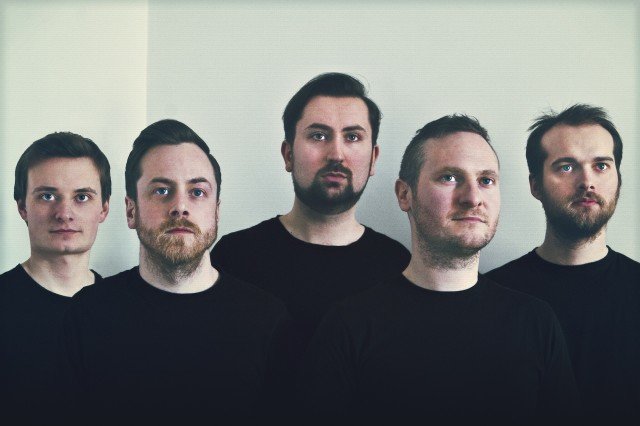Back in 2005-06, in my heady university days, a friend of mine took me to a gig at The Cockpit in Leeds, saying he’d ‘heard good things about this band, iLiKETRAiNS’. Whether he expanded on the capital letters / lowercase ‘i’s thing at that stage, I don’t remember. In any case, we arrived, and came across this pleasant sounding expanse of noise. We nodded and smiled – it sounded good – and after it finished we headed to the bar next door to get a drink. ‘Yeah, it was ace,’ my mate said ‘but I thought they had a singer.’ I shrugged, knowing no better – until we walked back into the main room to find another band, doing their stuff – with vocals. ‘Wait – this is iLiKETRAiNS!’ said my friend, loud enough to draw some disparaging glances from those nearby. The moral of the story is, I’ve come a long way on my iLiKETRAiNS journey in the past six years. But have the band themselves?
First, the support. Kicking off the show were four-piece Multiplier. They played to a full, if not packed room, and seemed to have a large portion of the audience onside from the very beginning – being the only locals they definitely brought a crowd. Even when the second song fell apart briefly, they were granted applause before the restart. The first song was promising – rich alternating major and minor chords that made great use of the Music Hall at Deaf Institute’s acoustics. Alongside, a great bass riff, and strong, relentless drums – the snare drum was played sans snare for I think the entire set, which kept it assertive but not militaristic.
It was a very confident performance – both in the musicality, which wasn’t afraid to let the sound fall back to nothing after building it up, and in the delivery. The lead singer very much commanded the textures of the songs, in the manner of Nick Cave – though to extend the comparison any further would be over-generous. There was swagger – even a grab of the crotch! – but drenching the vocals in reverb made it hard to determine lyrically exactly what passion was being displayed. The voice itself was in the vein of one of those Andrew Lloyd-Webber talent shows – which really isn’t a criticism in itself, it was strong, dynamic, and tuneful, but lacking in some of the intelligence which drove the music behind it. When it did defer occasionally to the guitar, it wasn’t always with the best results, with some incongruous glam rock guitar tones, but everything certainly came together for the last track, which featured a beautifully honest crescendo, each instrument playing its part in harmony.
Though I fear the name of the pleasant sounding Leeds instrumental act is forever expunged from my memory, I doubt I shall ever forget the second support, Talons, the unlikely coming together of two guitarists, two violinists, a bassist and a drummer. From the shimmering opening of the fuzzy electric guitar and a set of bruised and battle-scarred cymbals, to the ringing out of the very last chord, Talons are a captivating band. They claim not to be a post rock or math rock band – just simply ‘Talons’, an assertion of uniqueness I have no reason to decry – but there are tropes of the genres there. Punctuating drums, often highly staccato though never arrhythmic, and the almost classical repetition of a short phrase by the entire band.
And to anyone familiar with Talons, it almost goes without saying – it’s so, so tight. Not one drum rudiment, one arco, one guitar screech out of place. It’s often heavy, and rarely not loud, but the songs are cleverly designed that you can feel the textures spread from one instrument throughout the song. In their final song for example, a triplet sixteenth rhythm of rimshots is introduced, and as the song progresses, the same rhythm is adopted by other instruments in the band, as the drums and violins move on to other things. You may be forgive for thinking from the instrumental line-up that the violins are there in place of the vocal line. That’s not the case – though they do sometimes adopt a melody, if there’s anything vocal about the band, it’s the cavern-filling, messianic choral mass of guitar sound.
Talons songs feel like journeys, but the journeys I found the most interesting were the ones where I also picked up the names of the songs at the beginning. One was called ‘Anthropods’ – ‘what?’ a crowd member replied – so they told us! And it became easier to pick up the mechanical influences in the sound, the machinating rhythms of pizzicato violins and some tricksy guitar solo sections. The key was in the plural – as eventually you feel enveloped by the music, like a colony of ants envelops an invading enemy. It’s often aggressive stuff, not afraid to stake its territory. Another song was in honour of a bond villain, ‘Trevelyan’, and perhaps I was just projecting, but dark renditions of those syncopated John Barry rhythms seemed to percolate through the hysteric mass of noise. It was a celebration of something – not the bad guy, exactly, but the grandness of the antagonist’s role. And you find yourself celebrating along with them.
So have iLiKETRAiNS come a long way? Well they’ve restyled themselves at the typographically friendly I Like Trains. But I can’t give a fully educated answer, because technical issues prevented them playing some of their ‘more electro’ songs (in the words of lead singer Dave Martin). Apparently the front monitors weren’t working either, though the band were never out of sync or tune. There are certainly more synths, from the far sparser stage set-up I saw at The Cockpit – they couldn’t even go offstage to engineer their encore, as half of them were penned in by all the technology. It’s a good job that I Like Trains’s music isn’t the sort you thrash about to. It has the same effect on the body as shoegaze, but it’s less introspective – your attention is pulled up, not down (not least because of the projected film above their heads – more on that later).
It felt like a slow start to me. The first few songs seemed to have lost a bit of the intensity I’ve come to associate with their debut album, Elegies to Lessons Learnt – the cascading walls of sound replaced by more rhythmic but less interesting guitar riffs, and the chord progressions lacking in some intelligence. But as the evening progressed, the songs did too, each one seeming more mature than the last. Eventually, the proliferation of synths prove themselves to be a great addition. They’ve taken their time in figuring out exactly the right sounds – ‘underwater organs’ is probably a good starting place – and it has freed up the guitars to do some more interesting things. One song towards the end played the constancy of the synth, some great hollow woodblock-y guitars, and deliberately harsh sibilance at the end of vocal lines, perfectly against each other. Dave Martin’s voice is the most idiosyncratic element of the band, and though it sometimes takes over on record, for the most part live it was admirably ingrained within the textures.
Some cursory exploration of Wikipedia turned up a reference by Martin to wanting to embody a ‘sense of location’ lacking in the music of Godspeed You! Black Emperor and Sigur Ros. The full article has disappeared, because I would like to have known exactly what Martin meant by that. Not to dwell on it, but if ever there was music that takes you on a journey, it’s GY!BE, and every time I listen to Sigur Ros, I’m transported to the glacial landscapes of Iceland. But more importantly here, what is the ‘sense of location’ that I Like Trains are trying to embody? Manchester is notorious for turning out bands that sound like ‘Manchester’ – Leeds less so (Hereford, the sort-of hometown of Talons, I wouldn’t even know how to begin describing acoustically). Elegies often evoked mythic battlefields for me – not the kinetic energy of the battle scenes themselves, but the days, months and years after, as nature slowly reclaims the emotive resonance that such places hold. I’m sure that’s just a personal thing, but fair enough, it’s a sense of location. But A Rook House for Bobby, probably I Like Trains’s most recognisable song, and which marked the turning point in the set, isn’t really about a place at all, but an emotional engagement with the story of reclusive chess champion Bobby Fischer. The pronouns in lyrics like ‘you always told us what we wanted’ place a song within a relationship between at least two people.
But some of the ‘location’ of music like this has to come from the imagination. That’s my problem with the projections, a film broadcast in parallel to the set on a screen and two of the alcove panels behind the band. Though the imagery was suitably pixellated, washed out, or out of focus, it couldn’t help but ground the songs in very specific places. So one song apparently takes place or otherwise reflects the modern English countryside – bang goes my far-flung mythological battlefield. Though a chess piece only makes a brief appearance in A Rook House for Bobby, it still seemed to cheapen the whole song. It felt as though the band wanted to ensure you had the same thought processes as they did writing the songs. Some motifs worked – a globe divided by its longitude and latitude lines, a game of pong with only one side playing, their score inexorably racking up. And Terra Nova, a truly incredible song towards the end of the set which featured the projected name ‘Dr Edward Adrian Wilson’ – who I have since discovered was a polar explorer – did indeed feel like we were witnessing amazing icy foreign landscapes for the first time. I Like Trains are a band for articulating grand scenes – whether its people, landscapes or stories. But the imagery can be left to the audience.






Comments from Facebook
No Comments yet. Say something.